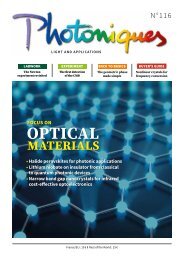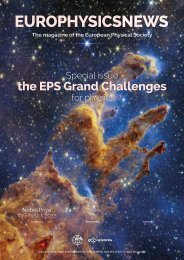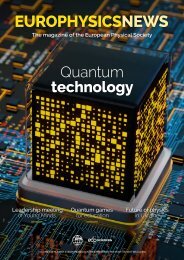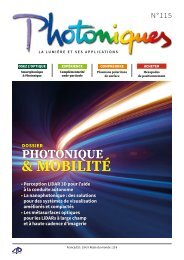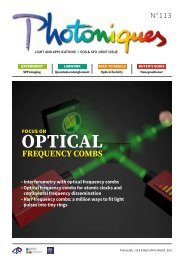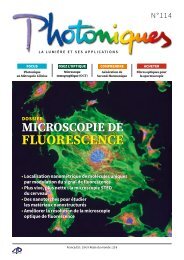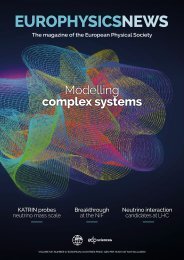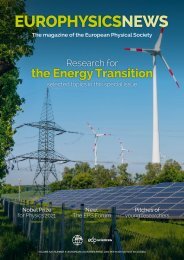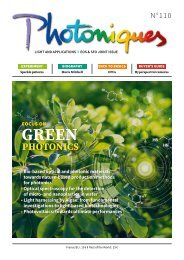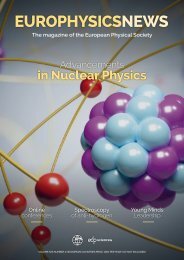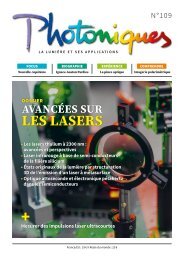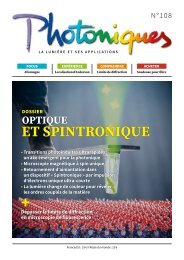EPN 53-3
Create successful ePaper yourself
Turn your PDF publications into a flip-book with our unique Google optimized e-Paper software.
YOUNG MINDS<br />
International Day of Women and Girls<br />
in Science event - Young Minds Groningen<br />
Accelerating progress towards full and equal access and participation<br />
of women and girls in science<br />
l Stefanie Brackenhoff and Akshara Viswanathan, EPS YM Groningen<br />
“You can’t solve a problem until you’re<br />
asking the right question. Raw data will<br />
not solve our problems, asking the right<br />
questions will.”<br />
Policymakers and faculty boards should<br />
consider this approach by Albert<br />
Einstein while dealing with diversity<br />
issues in science. On the 11 th of<br />
February 2022, the UNESCO Day<br />
of Women and Girls in Science, the<br />
Groningen Young Minds Section organized<br />
a webinar to discuss the barriers<br />
female scientists encounter. The<br />
event featured scientific talks by two<br />
renowned female scientists, followed<br />
by presentations about gender equality<br />
by two STEM practitioners, and an<br />
open discussion session.<br />
Role models - the agents<br />
of change<br />
Stating that “Being a woman in science<br />
is a responsibility in itself for the<br />
up-and-coming generation.” Prof.<br />
Irene D’Amico (Full Professor at the<br />
University of York) and Prof. Ivone<br />
Albuquerque (Full Professor at the<br />
University of São Paulo) kicked off<br />
the day, while Dr. Francesca Primas<br />
(Full astronomer at the European<br />
Southern Observatory and former<br />
Chair of the International<br />
Astronomical Union Working Group<br />
on Women in Astronomy) and Dr.<br />
Tana Joseph (Postdoctoral Research<br />
Fellow at the University of Amsterdam<br />
and Coordinator of the Netherlands<br />
Astronomy Equity and Inclusion<br />
Committee) picked up the gender<br />
equality baton for the afternoon.<br />
Prof. D’Amico talked about the use<br />
of networks of spins to perform quantum<br />
information processing and how<br />
evolutionary algorithms may help with<br />
this task [1]. Prof. Albuquerque welcomed<br />
us to the ‘Dark Side’ experiment<br />
that is designed to directly detect dark<br />
matter in the Universe [2]. Dr. Primas<br />
discussed a selection of past and ongoing<br />
equity, diversity and inclusion efforts<br />
in astronomy. Dr. Joseph outlined<br />
the advantages and disadvantages she<br />
experienced on her journey as an aspiring<br />
black female astronomer, and what<br />
we can learn from these experiences<br />
as a community. Parallel flashbacks<br />
between how astronomy in pre-internet<br />
South Africa grew versus how<br />
Dr. Joseph’s astronomy career started<br />
inspired the participants. During the<br />
open discussion, audience members<br />
were able to bring issues they experienced<br />
to the table.<br />
. Top left: Prof.<br />
Irene D’Amico.<br />
Top right:<br />
Prof. Ivone<br />
Albuquerque.<br />
Bottom left:<br />
Dr. Francesca<br />
Primas.<br />
Bottom right:<br />
Dr. Tana Joseph.<br />
A holistic view of equity,<br />
diversity and inclusion<br />
in astronomy<br />
“Diversity is the mix we want to achieve.<br />
Inclusion is what makes the mix work.”<br />
– Francesca Primas<br />
Dr. Primas discussed the gender<br />
gap in astronomy: although the influx<br />
of female students is approaching<br />
that of male students, women disproportionally<br />
experience discrimination<br />
(56% of women vs. 8% of men)<br />
or harassment (30% of women vs. 3%<br />
of men) [3]. Furthermore, the success<br />
rate of female astronomers in winning<br />
observing time on the Hubble<br />
Space Telescope and other facilities<br />
was found to be systematically lower<br />
than that of their male counterparts<br />
[4, 5, 6]. Preliminary results indicate<br />
that implementing dual-anonymous<br />
reviews removes this issue [7, 8]. Dr.<br />
Primas’ talk made ongoing efforts<br />
12 <strong>EPN</strong> <strong>53</strong>/3



